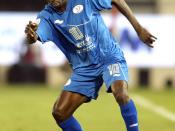Culture Shock Yeats' "The Second Coming" shares devastating final chaos and painful change with Achebe's Things Fall Apart. A powerful nation, America, built on religion and freedom of speech comes to a crashing halt in the twinkling of an eye. The nation grew in one hundred years, what others could not in one thousand. As Yeats believes that no civilization can remain static or evolve forever towards a more inclusive perfection. It must both collapse from with in and be overwhelmed from without and what replaces it will appear most opposite to itself being built from all that it overlooked or undervalued. If Yeats' beliefs stay true, America's civilization is doomed to change, as is, the world of Things Falls Apart.
The world's constant transformations come shockingly painfully, as shown in both works. Okonkwo stands guard against the white man and their religion as they invade his land, just as the "blood-dimmed tide is loosed, and everywhere" and what once was the tide in control and Okonkwo's culture in line disappears.
Overtaken with animosity as he returns to his fatherland, Okonkwo loses control over the white man and their new culture, because the leaders in his culture will not stand up to the white man. The "blood-dimmed tide" overtakes his enemy and the reckless tide cannot be controlled as it rushes upon the area. The "turning and turning in the widening gyre" relates to the new culture beginning as the old culture falls. A new order and culture plants itself in Okonkwo's world just as in the "Second Coming." A new religious period, where fighting for the god is legitimate, takes place in Okonkwo's world and the "widening gyre" goes in a direction opposite from any Okonkwo has previously experienced. Old cultures dying out and how it affects the people is the ultimate story behind Things Falls Apart and Yeats poem.
People often waiver from their true beliefs when a trauma presents itself. "The best lack all conviction, while the worst are full of passionate intensity," compares with the "two outcasts (who) shaved off their hair, and soon were the strongest adherents of the new faith," as the elders of the Mbanta tribe will not stand up for their faith (pg. 147). Faltering on their convictions, the "the best", who are the drowning leaders of the "Second Coming's" embroiled civilization, fail to stand up for their faith just as the elders and leaders of the Mbanta tribes do not fight for their gods. Both works share the distinct characteristic of leaders enfeebled as new cultures bestow themselves.
Certainly, these two works must have a deeper resolve. A message of the need for God and the inescapable necessity of maintaining faith throughout the good times so strength will be had for the bad. Seldom, is this an occurrence as the "the center cannot hold."




